Lochhead on Marketing
158 Crossing the Chasm & 22 Immutable Laws of Marketing: Through the Category Lens with Matt Johnson of the One Book That Changed My Life Podcast
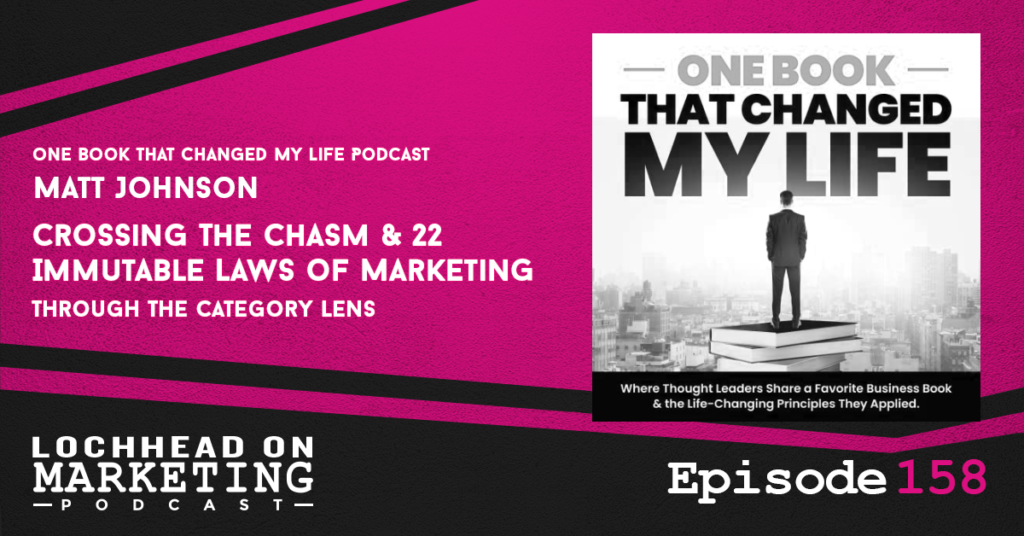
Podcast (lochheadonmarketing): Play in new window | Download (Duration: 54:29 — 37.4MB) | Embed
Subscribe: Apple Podcasts | Spotify | RSS | More
On this episode of Lochhead on Marketing, Matt Johnson and I have a conversation about the book that changed my life. In my case, it was two books in particular that changed my life. We look into them through a category lens perspective in Matt Johnson’s new podcast, One Book That Changed My Life Podcast.
Matt Johnson is the founder of PursuingResults.com. Matt and his firm were the original producers of my original Oddcast back in the Legends and Losers days, and he’s taught me a ton about podcasting. He’s got a legendary podcast called MicroFamous. Of late, he started a new podcast called one book that changed my life.
Welcome to Lochhead on Marketing. The number one charting marketing podcast for marketers, category designers, and entrepreneurs with a different mind.
Matt Johnson & Christopher Lochhead on how the two books made a difference
After a brief introduction of who Christopher Lochhead is and his works, Matt Johnson starts the discussion on the book. Particularly on the topic of what the situation was when he was reading the books for the first time, and how it affected Christopher and his views.
Christopher then talks about his background when he was first starting out his business as an entrepreneur and still learning the ropes. While there were a lot of books on marketing available, there was something about the 22 Immutable Laws the made him think, “this is the one.”
“I started to read them early on, and, and it immediately spoke to me. What their work really spoke to was, if you want to stand out, if you want to be super successful, and you want to make a big difference, you got to do it by being kind of radically unique in some way.” – Christopher Lochhead
Matt Johnson & Christopher Lochhead on the 22 Immutable Laws
Of the topic of the 22 Immutable Laws book, the one law that really stood out to Christopher was the 2nd law, which is the Law of Category. It states that, “if you can’t be first in the category, then set up a new category that you can be first.” Looking back, that law describes Category Design quite nicely.
Christopher also brings up the idea of the importance of solidifying and codifying your ideas and defining them as a category, rather than just sharing new thinking without establishing it first. Because it leaves others the chance to improve upon it and move into the category before you, and by then you’ve lost the category despite being the actual first to think about it.
Matt Johnson & Christopher Lochhead on Crossing the Chasm
As for Crossing the Chasm, Christopher explains that the book presents a great framework for understanding how new markets in tech, and in these days, pretty much all digital-related markets.
The book explains how new market categories develop. It has a standard kind of bell curve which introduces a non-obvious problem that anybody who’s introduced a new tech category has experienced, but had no lens or way of understanding the concepts.
On the side of the rising bell curve, you have the few innovators, followed by the slowly increasing number of early adopters. At the peak, you have the early majority, who mostly benefit from the experiments and not repeating the same mistakes as early adopters might have incurred. Then you have the downward slope, which features the late majority and the laggards who are late to the party.
To hear more from Matt Johnson and the rest of the podcast, download and listen this episode.
Bio
Matt Johnson is a marketing agency founder, podcaster, and musician. He runs a podcast launch & production agency based in San Diego, an international team that helps business coaches, consultants and thought leaders use done-for-you podcasting to attract an audience, build influence & become MicroFamous.
Matt is the author of MicroFamous and currently hosts the MicroFamous podcast. He is a frequent podcast guest and event speaker to audiences around the US, Canada, and Australia.
Links
Connect with Matt Johnson!
PursuingResults.com | One Book That Changed My Life Podcast | MicroFamous
We hope you enjoyed this episode of Lochhead on Marketing™! Christopher loves hearing from his listeners. Feel free to email him, connect on Facebook, Twitter, Instagram, and subscribe on iTunes!
157 How Category Contenders Become Category Leaders with Al Ramadan, Co-Author of Play Bigger

Podcast (lochheadonmarketing): Play in new window | Download (Duration: 1:12:12 — 49.6MB) | Embed
Subscribe: Apple Podcasts | Spotify | RSS | More
On this episode of Lochhead on Marketing, our guest Al Ramadan talks about what’s at stake when it comes to category battles, how you can spot the category challengers who can become category kings and queens, and what they need to become category leaders that earn 76% of the economics.
There comes a time in every startup’s life, where they face an epic, typically 18-to-36-month category battle. As we reported in our first book Play Bigger, the company that wins that battle earns 76% of the total value created in the category as measured by the market caps for public companies and valuations for private companies. What that means is, in any space, one company earns two thirds of the economics, which makes that category battle, which is typically 18 to 36 months long, arguably the highest stakes game in business.
This episode will be available on both Christopher Lochhead: Follow Your Different and Lochhead on Marketing, because we think it is that important that everyone must hear about it. So without further ado, let’s dive into this dialogue.
Play Bigger: Looking back, and its impact today
Al Ramadan comes into the conversation bearing data about the businesses and companies we’ve observed when writing Play Bigger, as well as some new players that have achieve the same feat since then.
To recap, Al Ramadan and Christopher Lochhead wrote a book back in 2014 called Play Bigger, which talks about category design and how it can make you become a category leader in your chosen space. One of the things they’ve found out in the course of their research is that Category Leaders tend to corner 76% of the value of said space.
Though when they wrote Play Bigger, the world was nowhere near as digitized as it is today. So a lot of the research was based on tech companies back then. But now, as more and more categories are behaving like tech categories due to digital scalability and digital reach, these findings are becoming true for every category.
Category Kings to Category Leaders
Al Ramadan shares that he and his team looked into the 35 Category Kings that they have observed back in Play Bigger, and check on their current situation in the market sphere.
In Play Bigger, we originally published a set of research and tracked 35 Category Kings in the tech space and their market caps at the time were 465 billion and those same companies today are now worth 1.9 trillion.
“If you track what happened to those 35 kings, as we call them back then, between the year of 2014 to the year of 2021. You want to know what the numbers are? At the time in 2014, the entire pool of the 35 category kings were valued at 465 billion. They are now valued at 1.9 trillion. That is, they’ve created more than $1,000,001.5 in market cap and the annual for those people who care about this stuff like Investors and Financial people. The compound interest growth rate of those kings. Market cap wise, is 22.46%.” – Al Ramadan
Given this data, it begs the question of how many understand that this is the new dynamic, and how many entrepreneurs and marketers still think that it’s a big leap of faith to follow.
To hear more from Al Ramadan and how Category Kings can become legendary Category Leaders, download and listen to this episode.
Bio
Al Ramadan is a co-founding partner of Play Bigger Advisors and coauthor of the book, Play Bigger. He also co-founded Quokka Sports, which revolutionized the way people experience sport online.
Al then joined Macromedia and Adobe, where he spent almost ten years changing the way people think about great digital experiences. At Adobe, Al led teams that created the Rich Internet Applications category and helped develop the discipline of experience design.
In the early ‘90s he applied data science to Australia’s Americas Cup — an innovation in sports performance analytics. His work in sailing led directly to the idea for Quokka. He lives in Santa Cruz, California.
Links
Connect with Al Ramadan!
Play Bigger | LinkedIn | Category Contenders
We hope you enjoyed this episode of Lochhead on Marketing™! Christopher loves hearing from his listeners. Feel free to email him, connect on Facebook, Twitter, Instagram, and subscribe on iTunes!
156 How to Drive B2B Revenue Now with White Space Marketing
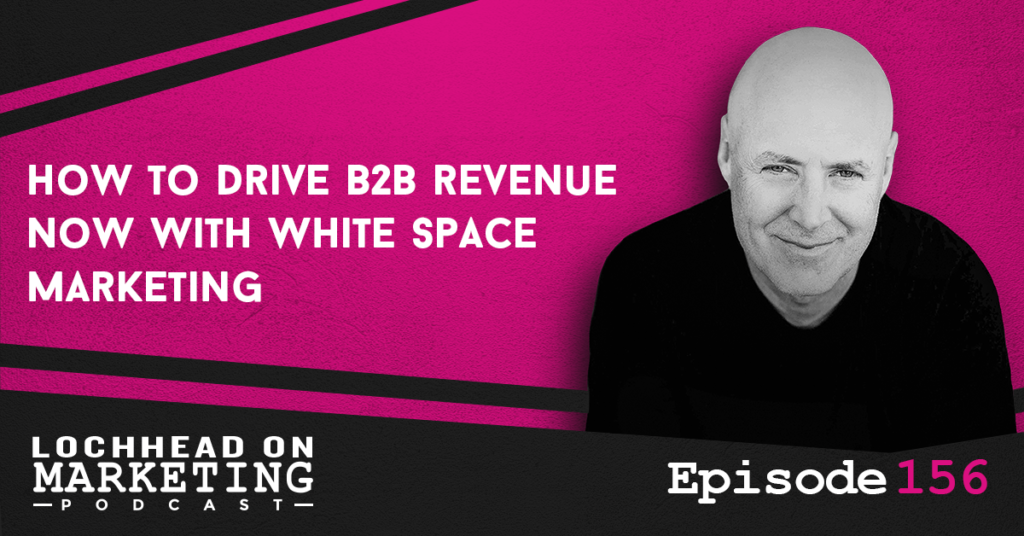
Podcast (lochheadonmarketing): Play in new window | Download (Duration: 12:30 — 8.6MB) | Embed
Subscribe: Apple Podcasts | Spotify | RSS | More
On this episode of Lochhead on Marketing, let’s talk about how marketing can drive revenue with White Space Analysis.
We talked about how to drive short-term revenue via category design a few episodes ago (LOM 151). Today, we provide you with more options to make that cash register sing as soon as possible.
Welcome to Lochhead on Marketing. The number one charting marketing podcast for marketers, category designers, and entrepreneurs with a different mind.
White Space Analysis & White Space Marketing
Let’s talk about White Space Analysis and White Space Marketing. Essentially, it is doing data science analysis on consumers and the product they purchased. From there, you can see what products or services they have not purchased, which is the “white space”, so to speak.
Now that you know this information, you can then focus on existing customers that have purchased some of your products, and target them with marketing for your products and services that they have not availed of yet.
This drives revenue quickly for your company, as you provide consumers with a “need” for something they don’t have yet.
How Mercury utilized White Space Marketing
Back in my CMO days in Mercury, we had a team led by one of the most legendary executives in the industry, Sue Barsamian. Sue got quite complicated with White Space Analysis; she was able to utilize it in real-time during one of the Big Customer User Conferences.
The team got the data on their big customers and found the products they do not use that go well with the ones they have purchased before from the company. Then, they made sure that the salespeople on the floor have this information, and subtly drove customers to product showcases and panels for the products they do not have.
They made sure to precisely market into that customer’s white space, thereby saving time and effort, while having a higher chance of a purchase afterward.
The fastest way to earn revenue
One could argue that doing White Space Marketing is the fastest way to earn revenue, as you are already marketing to existing customers. As we know, if they bought from us once, the likelihood they’re gonna buy from us again is very, very high.
So it’s surprising that a lot of companies don’t employ this strategy, opting to do spray-and-pray tactics rather than doing White Space Analysis and focusing their marketing there.
Once you have this information with you, your company can do a lot of things to funnel revenue and market share to your business.
To hear more about White Space Marketing, download and listen to this episode.
Bio
Christopher Lochhead is a #1 Apple podcaster and #1 Amazon bestselling co-author of books: Niche Down and Play Bigger.
He has been an advisor to over 50 venture-backed startups; a former three-time Silicon Valley public company CMO and an entrepreneur.
Furthermore, he has been called “one of the best minds in marketing” by The Marketing Journal, a “Human Exclamation Point” by Fast Company, a “quasar” by NBA legend Bill Walton and “off-putting to some” by The Economist.
In addition, he served as a chief marketing officer of software juggernaut Mercury Interactive. Hewlett-Packard acquired the company in 2006, for $4.5 billion.
He also co-founded the marketing consulting firm LOCHHEAD; the founding CMO of Internet consulting firm Scient, and served as head of marketing at the CRM software firm Vantive.
We hope you enjoyed this episode of Lochhead on Marketing™! Christopher loves hearing from his listeners. Feel free to email him, connect on Facebook, Twitter, Instagram, and subscribe on iTunes!
155 Content-Free Marketing: How the Marketing World Got Duped into Saying Nothing Everywhere (Snow Leopard Book Excerpt)
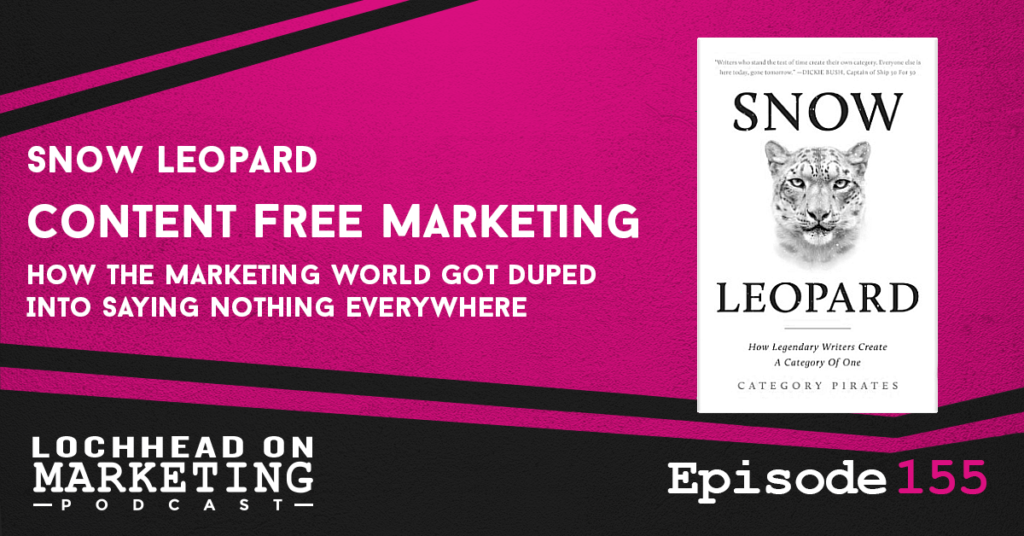
Podcast (lochheadonmarketing): Play in new window | Download (Duration: 57:05 — 39.2MB) | Embed
Subscribe: Apple Podcasts | Spotify | RSS | More
The Content Marketing category is almost 700 billion. Almost every company is working on content and increasing their content marketing investments. And yet, when was the last time you got a piece of content marketing and you said that was legendary? Let’s dig into how the marketing world got duped into content free marketing, aka saying nothing everywhere, and why this is one of the largest opportunities hiding in plain sight.
We recently launched our newest big book from category pirates. It’s called Snow Leopard: how legendary writers create a category of one. What you’re about to hear is the audio book read of me reading chapter three, which is all about content, free marketing, and why it’s a giant opportunity for the rest of us.
Welcome to Lochhead on Marketing. The number one charting marketing podcast for marketers, category designers, and entrepreneurs with a different mind.
Content-Free Marketing
The Content Marketing category is a $4 billion industry. And it’s estimated by 2024, the content marketing industry will grow another 270 billion, bringing the grand total to 700 billion.
But content marketing is broad and includes everything from creation to distribution to content management. For example, in 2020 the enterprise content management industry was valued at $47 billion and is projected to more than double over the next five years, to more than 105 billion translations of the soon to be 700 billion content marketing industry. 20% of the entire market is exclusively dedicated to managing the content that gets created.
Well, what’s the content? More importantly, how much of the content being created, especially by enterprise companies and b2c companies, is actually worth reading? When was the last time you clicked on a company blog post and opened a company newsletter or listened to a corporate podcast and said to yourself, “wow, sure am glad I clicked on that”? The fact that most content marketing is garbage represents one of the greatest marketing opportunities of our time, for those willing to buck current conventional wisdom.
Content Management
The Content Management subcategory of the mega content marketing category is growing faster than ever. And yet, the number one activity b2b companies outsource is content creation by a mile. Get this: 86% of b2b organizations surveyed said they outsourced content creation. The next closest activity is content distribution, which only 30% of b2b organizations surveyed said they did editorial planning.
Now, let’s connect these two data points. On one hand, Content Management is growing at breakneck speed, while Content Creation creates more to manage. On the other hand, content creation is often the number one most outsourced marketing activity. Which means companies are deferring the single most important aspect of content, which is the creation of each and every idea and who’s coming up with these ideas.
Gary Vee D
As we wrote about in our mini book, The Me Disease, many marketers today have, unfortunately, caught Gary Vee D. It is a content disease that leads creators and companies alike to believe the whole purpose of content creation is to do it and do it as often as possible. It doesn’t matter if it’s good or if it’s valuable. Just say it out loud and say it off and, “pump out 200 pieces of content today”.
Gary Vee and other digital marketing “gurus” have led the masses to believe the fact that you did it means you’re succeeding. More equals mo betta. And so, every marketer everywhere has adopted this spray and pray approach where 100% of the emphasis is on the output, and essentially zero of the emphasis is on the quality of the content, and what is actually being said.
To hear more about Content-Free Marketing, and how to avoid falling into this marketing trap, download and listen to this episode.
Bio
Christopher Lochhead is a #1 Apple podcaster and #1 Amazon bestselling co-author of books: Niche Down and Play Bigger.
He has been an advisor to over 50 venture-backed startups; a former three-time Silicon Valley public company CMO and an entrepreneur.
Furthermore, he has been called “one of the best minds in marketing” by The Marketing Journal, a “Human Exclamation Point” by Fast Company, a “quasar” by NBA legend Bill Walton and “off-putting to some” by The Economist.
In addition, he served as a chief marketing officer of software juggernaut Mercury Interactive. Hewlett-Packard acquired the company in 2006, for $4.5 billion.
He also co-founded the marketing consulting firm LOCHHEAD; the founding CMO of Internet consulting firm Scient, and served as head of marketing at the CRM software firm Vantive.
We hope you enjoyed this episode of Lochhead on Marketing™! Christopher loves hearing from his listeners. Feel free to email him, connect on Facebook, Twitter, Instagram, and subscribe on iTunes!
154 The Solo Thought Leader with Diego Pineda

Podcast (lochheadonmarketing): Play in new window | Download (Duration: 1:23:11 — 57.1MB) | Embed
Subscribe: Apple Podcasts | Spotify | RSS | More
On this episode of Lochhead on Marketing, let’s talk about how you can be a Thought Leader. More specifically, we’ll discuss how to be a Solo Thought Leader and build yourself up with our guest, Diego Pineda.
Diego Pineda is the author of the book The Solo Thought Leader: from Solopreneur to Go-To Expert in Seven Steps. Being viewed as a thought leader is a powerful thing. Becoming known for a niche that you own through leading thoughts is one of the most powerful ways to get there to either have a legendary career as a solo creator or a thought leader of some kind.
Welcome to Lochhead on Marketing. The number one charting marketing podcast for marketers, category designers, and entrepreneurs with a different mind.
Diego Pineda on Going Solo
The conversation starts off with the topic of the recent great resignation, or rather the aftermath of it. According to the data gathered over time, it seems that most of the people who resigned went solo or opened their own businesses.
“I actually talked to somebody who does this for a living, like helping people transition from being in a company to going solo. And he said, even just when the pandemic started, it was about 35% of the people were leaving their jobs. He thinks it is much larger than that. So there’s a lot of people just going out of their jobs and going solo. So this is a trend. And I mean, I think it’s gonna be growing.” – Diego Pineda
Why People are Going Solo
When asked why this was the case, Diego explains that it could be due to a number of things.
“I think there’s a few things. One is, people during the pandemic just realize what was possible, just working from home, having this freedom. They feel like managing their own time and not having to commute or being an office or all that BS that has to deal with our office politics. They realize there’s this option, so why go back?
Second, I think just the technology, the tools, and being able to just reach out people through LinkedIn, through social media and getting clients that way is possible. So people say it’s possible, so why not? I can do it. Right. So and then you get people like that on the internet, saying, “Hey, I reached in two years while going solo, I went from zero to a million.” Of course, those are some exceptional cases, but then other people will think it’s possible. “So why not me? Why not try it?” They just go for it.” – Diego Pineda
With new technology and tools being developed at breakneck speed, and existing ones being improved to be more versatile than ever, it’s really no wonder why someone would think they could go solo, as long as they learn how to make use of these tools at their disposal.
Be your own Thought Leader
When the topic of influencers and content creators just spewing out the same thoughts of someone who is at the forefront of a certain category, Diego agrees that not only is it not sustainable, but you are also competing for a small piece of that niche.
According to Diego, you need to be your own Thought Leader and come up with your own ideas. If nothing else, have a unique angle that can differentiate you from the rest. One way to do that is to find something that is dogma, or the “best” practice in an industry, and find if there is anything wrong with it. From there, you can come up with ideas that can fix the problem, or maybe come up with something entirely different as a solution.
To hear more from Diego Pineda and how you can be a Solo Thought Leader, download and listen to this episode.
Bio
Diego Pineda is the author of two novels, 9 non-fiction books, and hundreds of articles and blogs as a science writer, a business writer, and a sales and marketing writer.
He started his career as a medical writer while writing fiction on the side.
Diego is also a book coach helping solopreneurs and business leaders write their first book fast so they can become thought leaders in their industries, gain authority and visibility, and make more money.
Links
Connect with Diego Pineda!
The Solo Thought Leader | LinkedIn
We hope you enjoyed this episode of Lochhead on Marketing™! Christopher loves hearing from his listeners. Feel free to email him, connect on Facebook, Twitter, Instagram, and subscribe on iTunes!
153 The Three Marketing Metrics That Matter
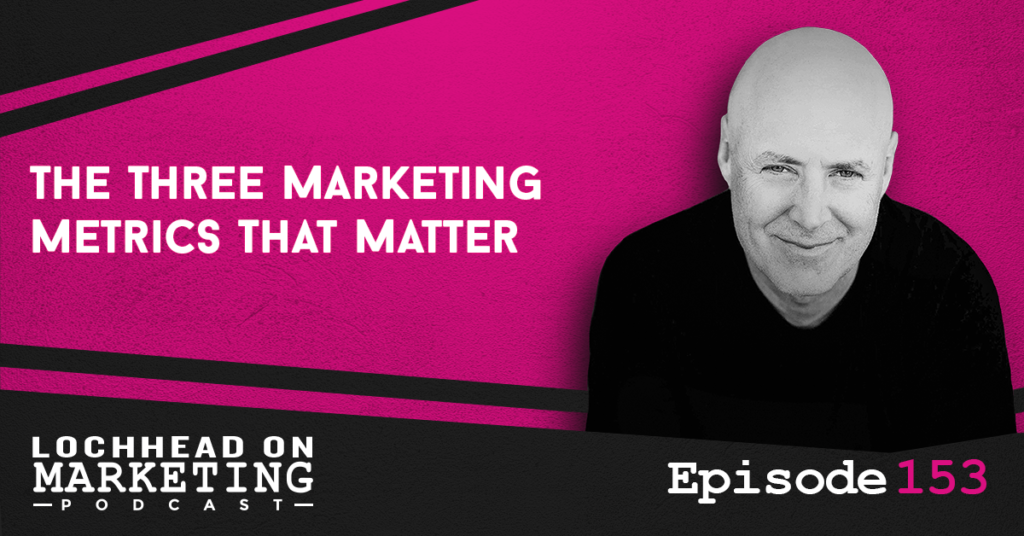
Podcast (lochheadonmarketing): Play in new window | Download (Duration: 13:37 — 9.4MB) | Embed
Subscribe: Apple Podcasts | Spotify | RSS | More
On this episode of Lochhead on Marketing, let’s talk about the three marketing metrics that matter. Because it appears as if there’s still a lot of confusion out there about this. So I thought we could unpack the real metrics that matter for marketing.
Welcome to Lochhead on Marketing. The number one charting marketing podcast for marketers, category designers, and entrepreneurs with a different mind.
The Three Marketing Metrics
Now, let’s talk about the three marketing metrics that matter, and break them down.
Marketing that does not drive revenue is not marketing
A lot of the counterarguments that I have received on this point is that marketing stuff people do can drive revenue. But the thing is, most of them do not drive long-term revenue. So if it doesn’t make the cash register sing consistently, It ain’t got that thing.
But what about brand advertising or Awareness campaigns? Those things only matter if you already have revenue coming in over time. If you’re trying to build up awareness and brand before putting up a good product and making good revenue out of it, that’s like putting the cart in front of the horse.
Marketing that does not drive category potential is not marketing
Related to creating revenue, is building up category potential. It’s important, as it helps build demand for your product, whether you are creating a new category, or revolutionizing one with your product.
Because when you have the ability to create demand, it will convert to revenue over time, which circles back to the first metric.
Marketing that does drive increases in the market cap or valuation is not marketing
Here’s the AHA for the third metric: investors in growth companies and stocks buy potential, not performance.
What drives our market cap is the investor’s perception of the size and growth rate of the category that we’re designing. Be their belief about our ability to prosecute the magic triangle, product, company, and category and earn 76% of the economics in the category that we are designing, because that’s the average number that the average category cleaner can get.
The other metrics like revenue growth, customer growth, margin growth, etc. are all metrics that validate that this company has massive potential.
How Legendary Marketing Executives do it
The most legendary marketing executives, CEOs and entrepreneurs, when they talk to investors, the first thing they say is that we are designing a legendary new market category that has massive growth potential. And let me tell you why. So they start with the potential and marketing creates that perception and then helps the company turn perception into reality.
Those are the metrics that matter: marketing needs to drive revenue, marketing needs to drive category potential, and then marketing needs to convert category potential in the eyes of investors into market cap. Because the company with the biggest market cap that is sustainable, I’m not talking about some kind of bullshit magic trick here. I’m talking about building enduring value over time. as measured by market cap, the number one market cap company in the category, always wins.
Revenue, of course, is a critical metric for driving market cap. But it’s not the only one. The perception of the future is actually more important from a market cap perspective. And so marketing drives revenue, short-term, medium-term, and long-term marketing drives market potential.
To listen to a more detailed explanation of the three marketing metrics, download and listen to this episode.
Bio
Christopher Lochhead is a #1 Apple podcaster and #1 Amazon bestselling co-author of books: Niche Down and Play Bigger.
He has been an advisor to over 50 venture-backed startups; a former three-time Silicon Valley public company CMO and an entrepreneur.
Furthermore, he has been called “one of the best minds in marketing” by The Marketing Journal, a “Human Exclamation Point” by Fast Company, a “quasar” by NBA legend Bill Walton and “off-putting to some” by The Economist.
In addition, he served as a chief marketing officer of software juggernaut Mercury Interactive. Hewlett-Packard acquired the company in 2006, for $4.5 billion.
He also co-founded the marketing consulting firm LOCHHEAD; the founding CMO of Internet consulting firm Scient, and served as head of marketing at the CRM software firm Vantive.
We hope you enjoyed this episode of Lochhead on Marketing™! Christopher loves hearing from his listeners. Feel free to email him, connect on Facebook, Twitter, Instagram, and subscribe on iTunes!
152 The Three Stages of a Legendary Career: What Star Wars Can Teach Us
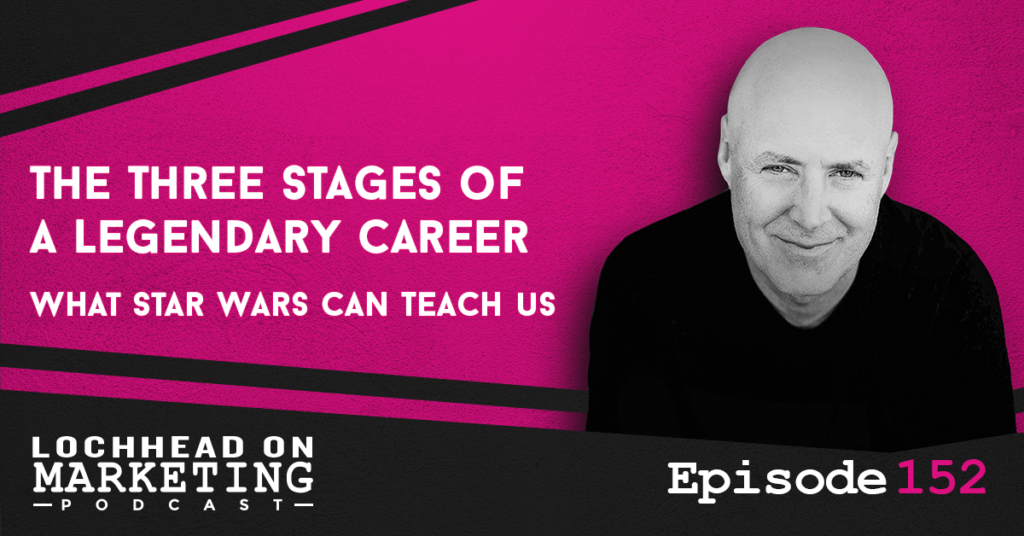
Podcast (lochheadonmarketing): Play in new window | Download (Duration: 17:34 — 12.1MB) | Embed
Subscribe: Apple Podcasts | Spotify | RSS | More
On this episode of Lochhead on Marketing, let’s talk about the three stages of a legendary career. Let’s also talk about the lessons we can learn about it from a source you wouldn’t think about at first, Star Wars. Yes, that Star Wars.
Welcome to Lochhead on Marketing. The number one charting marketing podcast for marketers, category designers, and entrepreneurs with a different mind.
Three Stages of Legendary Career: Star Wars Style
So how do we discuss legendary careers using Star Wars?
Well, if you look at it on a higher level, the three stages of having a legendary career follow a Jedi’s progression. There’s being a Luke / Lucy Skywalker stage, where you are just starting out. If you’re lucky and successful, there’s the Obi-Wan stage.
And if you are even more successful, and legendary at that, there’s the Yoda stage.
Jedi Breakdown
Let us explain even further.
When you’re first coming up, and if you are somebody who is gravitating towards the exponential different as opposed to the incremental better, or want to create, design, and dominate new future market categories, as opposed to just somebody who wants to kind of maintain the status quo, you get identified pretty quickly as being high potential. Much like Luke was as a padawan.
If this person is lucky and successful, and becomes a mentor or teacher for other upcoming high potential individuals, they enter their Obi-Wan stage. And if you end up being a legend in your chosen career, much like Yoda, you will have the authority and success that befits the position.
The True Reward
When I myself was a Luke, I thought that the rewards for being a person with high potential who excels and produces great results was that you get the recognition and fame, as well as the riches that come along with it.
But as you progress through the different levels of your career, you realize that while those rewards are worth pursuing, it is not the biggest reward out there.
The real reward is you get to a place in your 40s or 50s, where the world acknowledges you, as a champion, as a legendary Luke / Lucy Skywalker, and you graduate. Now, the world grants you the Obi-Wan status.
To hear more about the different legendary career and Star Wars, download and listen to this episode.
Bio
Christopher Lochhead is a #1 Apple podcaster and #1 Amazon bestselling co-author of books: Niche Down and Play Bigger.
He has been an advisor to over 50 venture-backed startups; a former three-time Silicon Valley public company CMO and an entrepreneur.
Furthermore, he has been called “one of the best minds in marketing” by The Marketing Journal, a “Human Exclamation Point” by Fast Company, a “quasar” by NBA legend Bill Walton and “off-putting to some” by The Economist.
In addition, he served as a chief marketing officer of software juggernaut Mercury Interactive. Hewlett-Packard acquired the company in 2006, for $4.5 billion.
He also co-founded the marketing consulting firm LOCHHEAD; the founding CMO of Internet consulting firm Scient, and served as head of marketing at the CRM software firm Vantive.
We hope you enjoyed this episode of Lochhead on Marketing™! Christopher loves hearing from his listeners. Feel free to email him, connect on Facebook, Twitter, Instagram, and subscribe on iTunes!
151 How To Drive Short Term Revenue Now
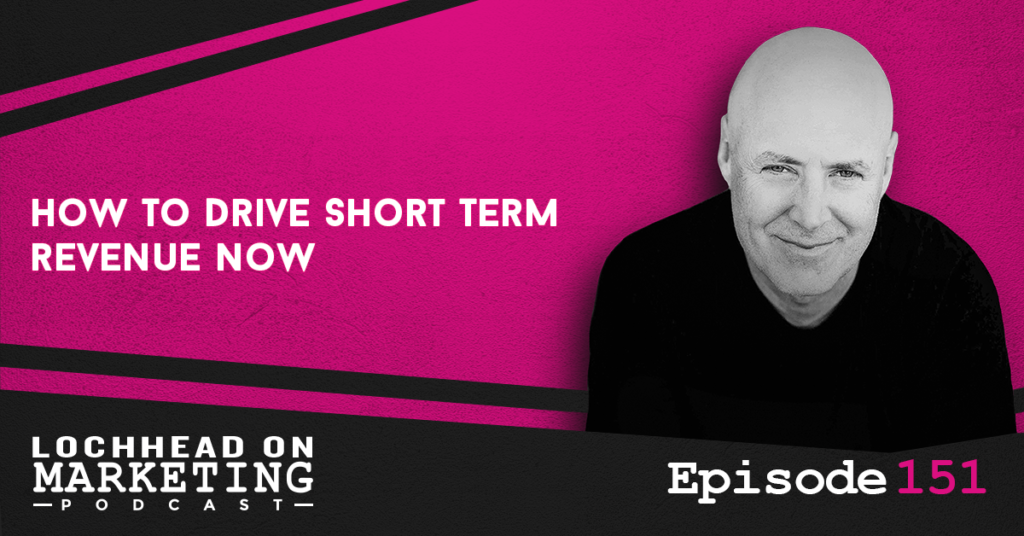
Podcast (lochheadonmarketing): Play in new window | Download (Duration: 21:50 — 15.0MB) | Embed
Subscribe: Apple Podcasts | Spotify | RSS | More
On this episode of Lochhead on Marketing, let’s talk about how to use category design thinking to drive short term revenue.
We talked a lot about what to do in a recession on our last episode, and on this episode, we’re going deep on a very specific topic, about how to make the cash register sing immediately.
Welcome to Lochhead on Marketing. The number one charting marketing podcast for marketers, category designers, and entrepreneurs with a different mind.
Short Term Category Design
One of the things that we hear about category design is category design is too expensive. Only big companies can design categories, or it takes too long it takes six to 10 years to build a category, we need revenue now. But the truth is that category design can drive revenue for you in the next immediate term days or weeks if you take a category science approach.
As we talked about on the last episode, most companies in a downturn compete harder and harder for demand existing demand that is falling. And it’s like fighting for the falling demand knife and cutting yourself into shreds.
Category design is distinct from Legacy approaches to marketing is actually the cheapest, fastest way to make the cash register sing.
Things to Consider
What I’m about to share with you is work that call Eddie and I are currently in the process of helping a legendary b2c tech company who is scaling at over 100% a year. In spite of that, they wanted to get really focused, particularly with the economy doing what it’s doing on how to continue their triple digit plus growth.
First, it starts with an understanding of super consumers. The general idea is that a very small number of consumers, customers, clients, readers, you know, consumers of any kind customers of any kind, typically 10% or less are the ones that are on the bleeding edge of what makes a category go. They’re super influential. They’re super committed to the category and typically to the brand leader in that category. They also tend to drive a lot of innovation; they also tend to be the ones that evangelize the loudest. So the first step is knowing your super consumers, and observing them.
This leads to the second point, which is a genius insight from Eddie, is that a super of one is a super of nine. That is to say, people who are passionate about something, tend to be passionate about several things. So what are the adjacencies that the Supers might also love? There’s a whole bunch of categories that they might be interested in.
To learn more about how to drive short term revenue through category design, download and listen to this episode.
Bio
Christopher Lochhead is a #1 Apple podcaster and #1 Amazon bestselling co-author of books: Niche Down and Play Bigger.
He has been an advisor to over 50 venture-backed startups; a former three-time Silicon Valley public company CMO and an entrepreneur.
Furthermore, he has been called “one of the best minds in marketing” by The Marketing Journal, a “Human Exclamation Point” by Fast Company, a “quasar” by NBA legend Bill Walton and “off-putting to some” by The Economist.
In addition, he served as a chief marketing officer of software juggernaut Mercury Interactive. Hewlett-Packard acquired the company in 2006, for $4.5 billion.
He also co-founded the marketing consulting firm LOCHHEAD; the founding CMO of Internet consulting firm Scient, and served as head of marketing at the CRM software firm Vantive.
We hope you enjoyed this episode of Lochhead on Marketing™! Christopher loves hearing from his listeners. Feel free to email him, connect on Facebook, Twitter, Instagram, and subscribe on iTunes!
150 How To Make Money In A Recession: 5 Steps To Create Demand For Your Product, Service, Or Platform
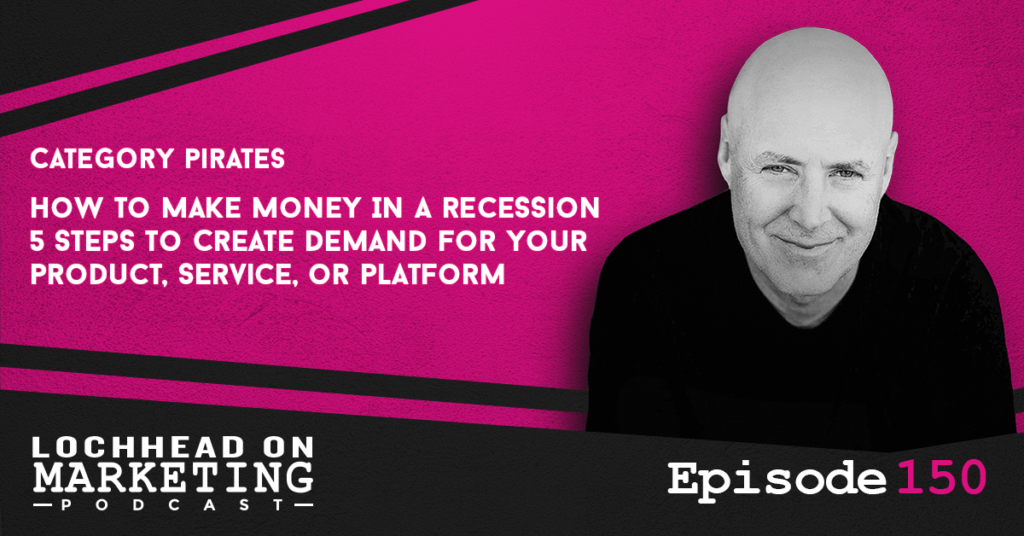
Podcast (lochheadonmarketing): Play in new window | Download (Duration: 39:27 — 27.1MB) | Embed
Subscribe: Apple Podcasts | Spotify | RSS | More
Welcome to a very special episode of Lochhead on Marketing, where we talk about how to make money in a recession.
In times that are challenging, one of the greatest things we all can do is contribute what we can contribute. Given that it looks like we’re about to be in a recession, what Eddie Yoon Nicolas Cole, and I aka the Category Pirates decided to do was to write a new mini book newsletter. It’s called How To Make Money In A Recession: Five steps to create demand for your product, service or platform.
We elected to make the written version of this free. There’ll be a link to it at the end of this show notes. So consider this episode, a mini book audio read.
We are in a Recession
Dear Friend, Subscriber, and Category Pirate,
We are in a recession.
(Not officially, but it is not looking good.)
Stocks are down. Startup valuations have plummeted. Bitcoin and Ethereum have lost more than 50% of their total value since their respective highs back in November, 2021. And sentiment around Silicon Valley is that the next 12-18 months are going to be challenging for companies looking to raise money.
But where there is chaos, there is opportunity.
Approximately 10% of companies get stronger in downturns. And you can’t be in the 10% unless you do some serious thinking.
Through the category lens, downturns are simple to understand—and have a clear path to navigate. When times get tough, businesses, governments, households, and individuals all do the same thing: they create two lists.
- “Must Haves”
- “Nice To Haves”
Then they start cutting the “Nice To Haves” to lower costs—as a direct response to their revenue / income / buying power shrinking.
The Question Every Business Should Ask
Which means the seminal question is: what makes people put some categories/brands/products on the “Must Have” list versus the “Nice To Have” list?
Perceived value.
(Everything we value, we’ve been taught to value.)
The difference between a dumb idea and a great one, or the difference between useful products and useless ones is the perception we have based on what we have been taught. (Don’t forget: pet rocks used to be in demand.)
The trick is to get your product/service/platform on the “Must Have” list, and to be as high up on the list as possible. Because the higher the category is on the hierarchy of perceived value in the consumer’s mind, the greater the likelihood they will keep buying from you.
Which is why savvy leaders market the category in downturns.
Because people make their lists by category first, and brand second.
The Net-Positive Effects of Recession
Elon Musk was a guest on the All In podcast and summarized the net-positive effects of recessions well:
“Recessions are not necessarily a bad thing. I’ve been through a few of them. What tends to happen, if you have a boom that goes on for too long, you get misallocation of capital. It starts raining money on fools, basically. Any dumb thing gets money. At some point, it gets out of control… and the bullshit companies go bankrupt and the ones that are building useful products are prosperous.”
When most people hear the word “recession,” they imagine the housing crisis of 2008 or the dot-com bubble in the late 90s—and all of the businesses that went under as a result.
But what doesn’t get talked about enough are the incredible companies that emerged out of these challenging times as well. Google and Amazon both came out of the dot-com bubble in the 90s (as did hundreds of other world-changing companies). And Uber, Spotify, Airbnb, Square, and dozens of other next-gen technology companies were founded between 2006 and 2009, right in the middle of the greatest financial crisis to ever threaten America.
Recessions are pressure-cookers that rid the system of businesses failing to live up to the value they are promising society.
To hear more on how you can make money even during a recession, download and listen to this episode.
Bio
Links
How To Make Money In A Recession
We hope you enjoyed this episode of Lochhead on Marketing™! Christopher loves hearing from his listeners. Feel free to email him, connect on Facebook, Twitter, Instagram, and subscribe on iTunes!

